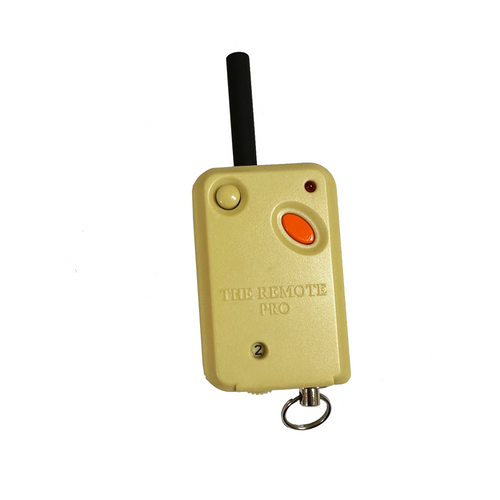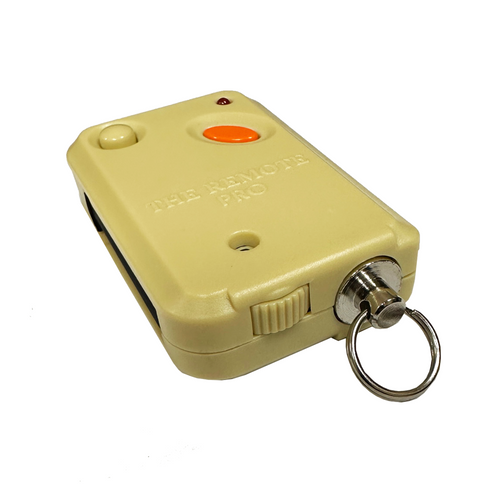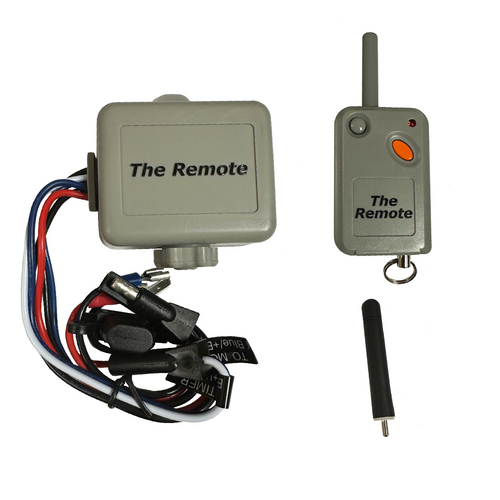The Remote Twin Pack gives you (2) The Remote Receivers and (1) The Remote Transmitter allowing you to create two feeders that can be controlled with one transmitter.
Easy to install wildlife feeder remote, control your feeder with the push of a button from distances out to 175 yards. Don't be fooled by the $30 big box store feeder remote controls. If you think you are getting a better deal there, think again. Be prepared to also purchase 2-3 extra solar panels to insure your feeder battery will not be dead a month after you hook it up. You get what you pay for and this remote is the best one on the market!
The Remote Instructions Download
Troubleshooting and tips for THE-REMOTE
The-Remote transmitter and receiver are designed for use with a direct line of sight from the transmitter to the receiver. There are several things that can interfere with the signal reception/transmission.
- The ground- the lower the receiver is to the ground - the more signal distortion can occuWeather conditions- fog and rain can shorten the signal.
- Physical barriers. The signal works through glass and plastic but dense wood and metal can block and distort the signal. This includes wire fencing material and gridded wire.
The most common troubleshooting question is can the receiver be mounted within a wire varmint cage?
Yes, the receiver can be mounted with-in a wire varmint cage but the reception distance may be shortened. Gridded wire interferes, distorts, and can even entirely block the RF signal. This is known as the Faraday shield. One way to remedy this is to move the receiver outside of the cage. In most instances the wires will need to be extended. Another procedure to try is to remove the antenna entirely or extend the antenna. This does not always help but in many cases will increase the reception. The best reception for the receiver is when there is no interference from cages, as high from the ground as possible, and when the receiver antenna is mounted in a vertical (up or down) position.
A common user error is in the way the transmitter is held and operated. The transmitter button needs to be depressed for at least one second. The receiver looks for a signal once a second for only about 5 milliseconds. The button needs to hit this 5-millisecond time. If you only tap the transmitter button and not hold it for a full second, you will likely not hit the 5-millisecond window. The signal from the transmitter comes out of the side of the antenna. The signal does come out of the end of the antenna as pointing your finger. The transmitter antenna needs to point upward while depressing the button for a full second. The remote does not need a timer to operate a motor. It can be wired directly to a motor. The timer wiring would not be used in this case.
THE-REMOTE plugs and plays directly with THE-TIMER. Follow the wires as marked. When wired into a timer and motor circuit other than THE-TIMER, the polarity of the wires from the timer to the motor needs to be verified. Do not go by wire color assumptions for polarity. Use a meter to determine polarity from your timer to the motor. Damage to your timer may occur if the timer has no internal protection. Do not use the "to timer" wiring but only use the "to motor" wiring. "T" these wires into your motor circuit making sure the polarity is correct.
There is a fuse (15 amp blue mini) on THE-REMOTE power supply wires.
The battery inside the transmitter is a 27A. Be sure to change this battery at least yearly.
Sometimes light corrosion from an old transmitter battery can accumulate on the battery screw lid. This corrosion needs to be removed for proper connectivity.
The transmitters are not waterproof. If they get rained on, they will likely fail over time. If you wash them with your clothes, they will fail. When not in use, it is best to store the transmitters in a dry place such as indoors.
























